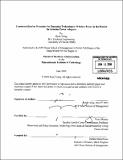Commercialization strategies for emerging technologies : wireless power in the market for external power adapters
Author(s)
Tseng, Ryan
DownloadFull printable version (47.18Mb)
Other Contributors
Sloan School of Management.
Advisor
Fiona Murray.
Terms of use
Metadata
Show full item recordAbstract
The purpose of this thesis is to explore the different challenges facing start-ups that are engaged in intense competition to lead the commercialization of a complex technology that is initially unable to meet the demands of a market. Technology, intellectual property, and go-to market strategies are proposed with a particular focus on wireless power technology in the market for external power adapters. Wireless power technology is a revolutionary technology that promises to replace the two billion external power adapters that are sold every year. It is a seemingly attractive opportunity for a start-up company, but the technology is complicated, the intellectual property landscape is dense, and the competition is intense. The technology will be sold into the pre-existing market for external supplies, which is reeling from declining prices and margins. The market is in need of change, and is looking for innovations that will improve the situation. The commercialization of wireless power technology is a case example of how start-up technology companies can accelerate development times, reduce risk, and build sustainable competitive advantage by carefully planning their technology approach, fully understanding the intellectual property landscape, and leveraging the principles of open innovation. A technology strategy requires the selection of a technology vector which should be determined by weighing the importance of individual product features against the expected levels of technical risk. (cont.) Within its technology vector, a company must evaluate the strategic importance the various engineering activities based on whether they enable freedom to operate, contribute to the creation of blocking patents, and/or are outside the expertise of potential partner organizations. The start-up should intensely focus its engineering resources on the strategically important activities while farming the remainder of the development work to partner organizations within the greater value chain. A start-up entrenched in a competitive battle to serve a hungry market; with a green technology solution, faces a difficult choice: go to market niche by niche and face irrelevance in the greater market, or swing for the fences and risk bankruptcy. There are options beyond the traditional approaches, and in this case, a three track commercialization strategy is appropriate.
Description
Thesis (M.B.A.)--Massachusetts Institute of Technology, Sloan School of Management, 2009. Includes bibliographical references (leaves 52-54).
Date issued
2009Department
Sloan School of ManagementPublisher
Massachusetts Institute of Technology
Keywords
Sloan School of Management.